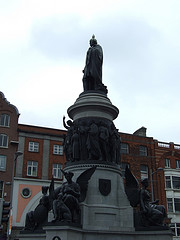2. The plane took off on time
In topic 3 of this unit you learned what phrasal verbs are (verbs and a preposition or adverb) and you studied a few examples with 'get'. Now you are going to learn some phrasal verbs related to travelling.
Read these sentences containing phrasal verbs and match them with one of the meanings below.
1. The thief drove off in a red car.
2. Will you pick me up at the airport?
3. Slow down. You are driving too fast.
4. You usually have to check in at least one hour before your flight.
5. The plane took off at 11 am and landed at 7 pm.
By Vijay Gunda, C. Commons
a. Announce your arrival.
b. To leave in a car.
c. Depart from the ground.
d. Collect.
e. Reduce the speed.
Complete the gaps with the correct form of these phrasal verbs. If you don't know the meanings, look the verbs up in a dictionary.
see off, break down, drop off, run over, set off
1. Get in my car. I'll you at your flat.
2. Sorry I'm late but my car on my way to work.
3. We early in the morning because we wanted to arrive as soon as possible.
4. They us at the airport when we were leaving our country.
5. A car him and, unfortunately, he died instantly.You can practice some of these phrasal verbs and learn some other verbs by doing these exercises:
| Exercise 1 |
Exercise 2 |
 |
| By jen-the-librarian, C. Commons |
Some common Irish surnames contain the preffix Mac or O, traditionally denoting descent. Mac means 'son' in Gaelic, and O indicated that the surname was derived from an earlier ancestor than Mac. The Mac preffix is also associated with Scotland.
Some common Irish surnames are: MacCarthy, MacGrath, MacKenna, MacNamara, O'Connell, O'Brien or O'Donnell.
If you are interested in learning more about Irish surnames and the origin and meaning of these names, you can visit this website.
